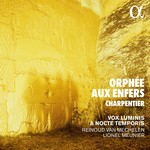
Charpentier: Orphée aux enfers
 $35.00
Out of Stock
$35.00
Out of Stock6+ weeks add to cart
MARC-ANTOINE CHARPENTIER
Charpentier: Orphée aux enfers
Vox Luminis / A Nocte Temporis / Lionel Meunier / Reinoud Van Mechelen
[ Alpha / CD ]
Release Date: Friday 24 January 2020
This item is currently out of stock. It may take 6 or more weeks to obtain from when you place your order as this is a specialist product.
The Orpheus myth was as important for the birth of opera in France as it had been in Italy. In 1684, Charpentier composed a work for three voices, Orphée descendant aux Enfers. With this piece, remarkable for its style and concision, he showed how well he had assimilated Carissimi's art. It is a dramatic scene, similar to the 'sacred histories' of the Roman master. The text, by an unknown author, narrates Orpheus' quest for his beloved in the Underworld. The hero's haute-contre gives him an elegiac timbre - this was the vocal register in which Charpentier, himself a singer, excelled. In 1687 he created his second illustration of the myth, La Descente d'Orphée aux Enfers. In its two acts can be discerned the outline of a possible complete opera - the manuscript has reached us shorn of the third act in which Orpheus would presumably have lost Eurydice before being devoured by the Maenads. While La Descente d'Orphée has already been recorded several times, the Orphée of 1684 is a rarity and a magnificent discovery. In these two roles that might have been written for him, Reinoud van Mechelen is at the peak of his artistry, while his ensemble A Nocte Temporis and Lionel Meunier's group Vox Luminis blend in perfect symbiosis.
"Van Mechelen is a seductive Orpheus - small wonder that his limpid, pliant, expressive voice and eloquent diction enchants both his nymph-bride Eurydice (brought to life here by the dewy-voiced Déborah Cachet) and the god Pluto (stylishly sung by Geoffroy Buffière)…The sensitive interplay of voices and instruments has all the intimacy of chamber music…Alpha Classics's recording is luminous and detailed." - Five Stars BBC Music Magazine March 2020 - Opera Choice
"The music for the viols is simply ravishing, and it's beautifully played. Van Mechelen sings powerfully, with more than a touch of desperation. The other instruments of A Nocte Temporis provide excellent support." Gramophone
"Stylishly beguiling accounts of two of Marc-Antoine Charpentier's shorter music dramas...Van Mechelen, co-directing with Meunier, is a mellifluous, unhurried Orphée, unsurprisingly charming the damned souls." Sunday Times
Tracks:
Orphée descendant aux Enfers, H.471:
Prélude
Récit d'Orphée, violon lentement
"Effroyable enfers, où je conduis mes pas"
"Quelle douce harmonie a frappé mon oreille?"
"Vos plus grands criminels rongés par des vautours"
"Ne cherchons plus d'où vient cette tendresse"
La descente d'Orphée aux Enfers, H.488:
Ouverture
"Inventons mille jeux divers"
"Compagnes fidèles"
"Soutiens-moi, chère Énone"
"Qu'ai-je entendu ? Que vois-je?"
"Ah ! Bergers c'en est fait"
Entrée de Nymphes et de Bergers désespérés
"Lâche amant, pourrais-tu survivre"
"Ne tourne point, mon fils"
"Que d'un frivole espoir"
"Affreux tourments, gênes cruelles"
"Cessez, cessez fameux coupables"
"Quelle touchante voix"
"Je ne refuse point ce secours"
"Il n'est rien aux Enfers"
Entrée des Fantômes
"Que cherche en mon palais ce mortel téméraire?"
"Je ne vis point ici, Monarque des Enfers"
"Pauvre amant, quel cœur de rocher"
"Eurydice n'est plus, et mon feu dure encore"
"Le destin est contraire à ce que tu souhaites"
"Tu ne la perdras point, hélas, pour le la rendre"
"Quel charme impérieux m'incite à la tendresse?"
"Souviens toi du larcin que tu fis à Cérès"
"Je cède, je me rends, aimable Prosperine"
"Vous partez donc, Orphée?"



